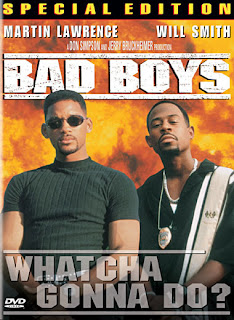Title: Fanboys
Year of Release: 2008
Date Viewed: February 4th, 2011
MPAA Rating: PG-13
Three and a half decades ago, in the galaxy we're living in, a young filmmaker named George Lucas penned a script that would evolve into an iconic legacy. A year later, the Star Wars empire was born; a franchise that had enraptured one of the largest followings the pop culture world would ever see. It's not uncommon to meet fans that regard the movies so close to their identity that it has helped shape their personalities and influenced their daily philosophy. The most creative ones were inspired enough to create their own spinoffs and tributes to the franchise they adored.
Fanboys is one of the most affectionate celebrations of Star Wars geekdom to reach the mainstream and has made yours truly proud to be a part of it.
The movie's story is set in the fall of 1998, seven months before the release of the eagerly anticipated Episode 1: The Phantom Menace. Eric Bottler (Sam Huntington) arrives at a Halloween party to pay a visit to his three high school friends whom he hadn't seen in a long while. Their universal love of Star Wars is what originally brought them together. But life's natural courses had drifted them apart. The brush of nostalgia turns sour when it's revealed to Eric that Linus (Chris Marquette) is facing terminal cancer and is estimated to have only four more months to live. Not long enough to see the new movie on its scheduled premiere date. Eric feels guilty over taking so long to reconcile with his friend. To make amends for it, he structures a plan to turn their childhood fantasy of infiltrating George Lucas' home into a reality. Getting their hands on an early print of The Phantom Menace is Linus' only hope of seeing what he had waited so long for. That part is difficult enough. But add car trouble, the police and psychotic Star Trek fans into the fray and it becomes an adventure.
If you have ever dreamed of owning a lightsaber or have used dialogue from the Star Wars movies in regular conversation, this is the perfect film for you. It's a nice reminder of how long lasting friendships can be instigated through a medium of entertainment. It can be fairly said that George Lucas is indirectly responsible for creating millions of social gatherings with many resulting in relationships that stretch much further than that. It brings back a personal memory of how I met someone because I overheard him mention the name Ric Flair. This inspired me to introduce myself to this fellow pro wrestling fan. Then we found more things that we had in common and our friendship grew stronger. It was the initial reference to what we had in common that made it all possible. Thanks, Ric.
It should be established that this is a tribute film made by the fans for the fans. Not just of Star Wars but cult followings in general. Outsiders are free to peek in but may find certain things to be lost on them, such as why Eric's comment "It's just a movie" is met with disdain. People who are already onboard with the idea will applaud at the numerous cameos by celebrities closely associated with cult followings. Their presence contribute some of the movie's best moments.
Although most of the characters are written to have a low IQ level, it never feels condescending to geek culture they represent. They may not have evolved much since high school but we are left with reason to believe they will mature in the unwritten epilogue.
The only real beef I have with the movie is the final line of dialogue. It was unnecessary and alienating to certain groups of its target audience. Out of place for something that promotes unity among peers.
Although shooting had wrapped in 2005, it took nearly three years for the movie to get a national release. The main reason for the delay was producer Harvey Weinstein's long-standing campaign for re-shoots and script revisions. Weinstein had a tone in mind that was different than what writers Adam Goldberg, Ernest Cline, and director Kyle Newman had envisioned. Most notably, he wanted all traces of the cancer subplot to be removed. In the end, the material stayed in the script. I was indifferent about the controversy up until I saw the completed film. It then became clear to me that if Weinstein had gotten his way, it would have been a travesty. The story would have lost its heart and then the project would have looked stupid and offensive. What also became clear at the moment was that the story is actually about friendship. Embarking on a journey with someone close to you is more rewarding than reaching the destination. The characters do not pick up on this lesson until the story's conclusion. When I did, I offered a grateful thanks to the friend that came to see this movie with me.
Rating: 8



